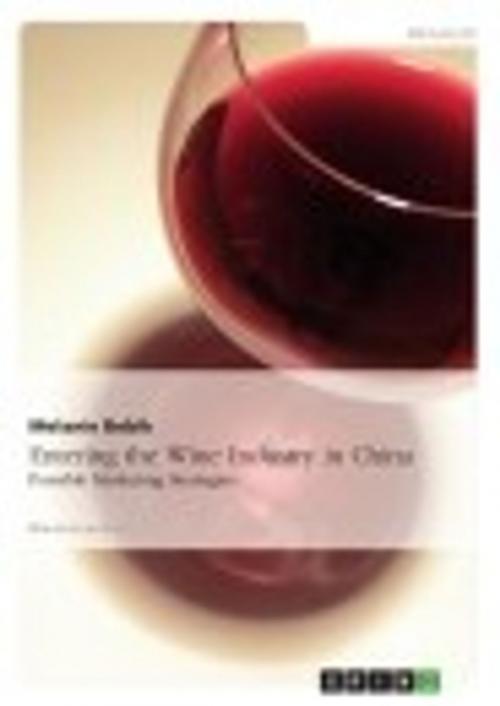Entering the Wine Industry in China
Possible Marketing Strategies
Business & Finance, Marketing & Sales| Author: | Melanie Bobik | ISBN: | 9783656108771 |
| Publisher: | GRIN Verlag | Publication: | January 24, 2012 |
| Imprint: | GRIN Verlag | Language: | English |
| Author: | Melanie Bobik |
| ISBN: | 9783656108771 |
| Publisher: | GRIN Verlag |
| Publication: | January 24, 2012 |
| Imprint: | GRIN Verlag |
| Language: | English |
Master's Thesis from the year 2010 in the subject Business economics - Marketing, Corporate Communication, CRM, Market Research, Social Media, grade: 1,3, Berlin School of Economics and Law, language: English, abstract: China is turning into one of the world's largest, most lucrative food and beverage markets. With a growing middle class, the demand for premium lifestyle products is constantly increasing. A new generation of consumers, typically located in urban areas, is emerging, with more disposable income and a greater awareness and willingness to pay for high quality, often imported products - including wine. Wine has become 'fashionable' as a symbol of social status and this trend is likely to continue. Further, the health benefits associated with red wine in particular, have convinced some consumers to switch from traditional Chinese alcoholic beverages to grape wine. Although China traditionally is a rice-wine-consuming country and unlike in many Western countries, grape wine is considered a luxury product, the grape wine market1 has grown rapidly since its emergence in the mid 1990s, with still wine being the most lucrative. According to a recent survey, in 2009 the Chinese wine market generated total revenues of US$ 7,2 billion which constitutes a compound annual growth rate of 5,3% for the period from 2005 to 20092. As wine consumption in China is closely related to income, there is no end in sight to this positive trend.
Master's Thesis from the year 2010 in the subject Business economics - Marketing, Corporate Communication, CRM, Market Research, Social Media, grade: 1,3, Berlin School of Economics and Law, language: English, abstract: China is turning into one of the world's largest, most lucrative food and beverage markets. With a growing middle class, the demand for premium lifestyle products is constantly increasing. A new generation of consumers, typically located in urban areas, is emerging, with more disposable income and a greater awareness and willingness to pay for high quality, often imported products - including wine. Wine has become 'fashionable' as a symbol of social status and this trend is likely to continue. Further, the health benefits associated with red wine in particular, have convinced some consumers to switch from traditional Chinese alcoholic beverages to grape wine. Although China traditionally is a rice-wine-consuming country and unlike in many Western countries, grape wine is considered a luxury product, the grape wine market1 has grown rapidly since its emergence in the mid 1990s, with still wine being the most lucrative. According to a recent survey, in 2009 the Chinese wine market generated total revenues of US$ 7,2 billion which constitutes a compound annual growth rate of 5,3% for the period from 2005 to 20092. As wine consumption in China is closely related to income, there is no end in sight to this positive trend.















